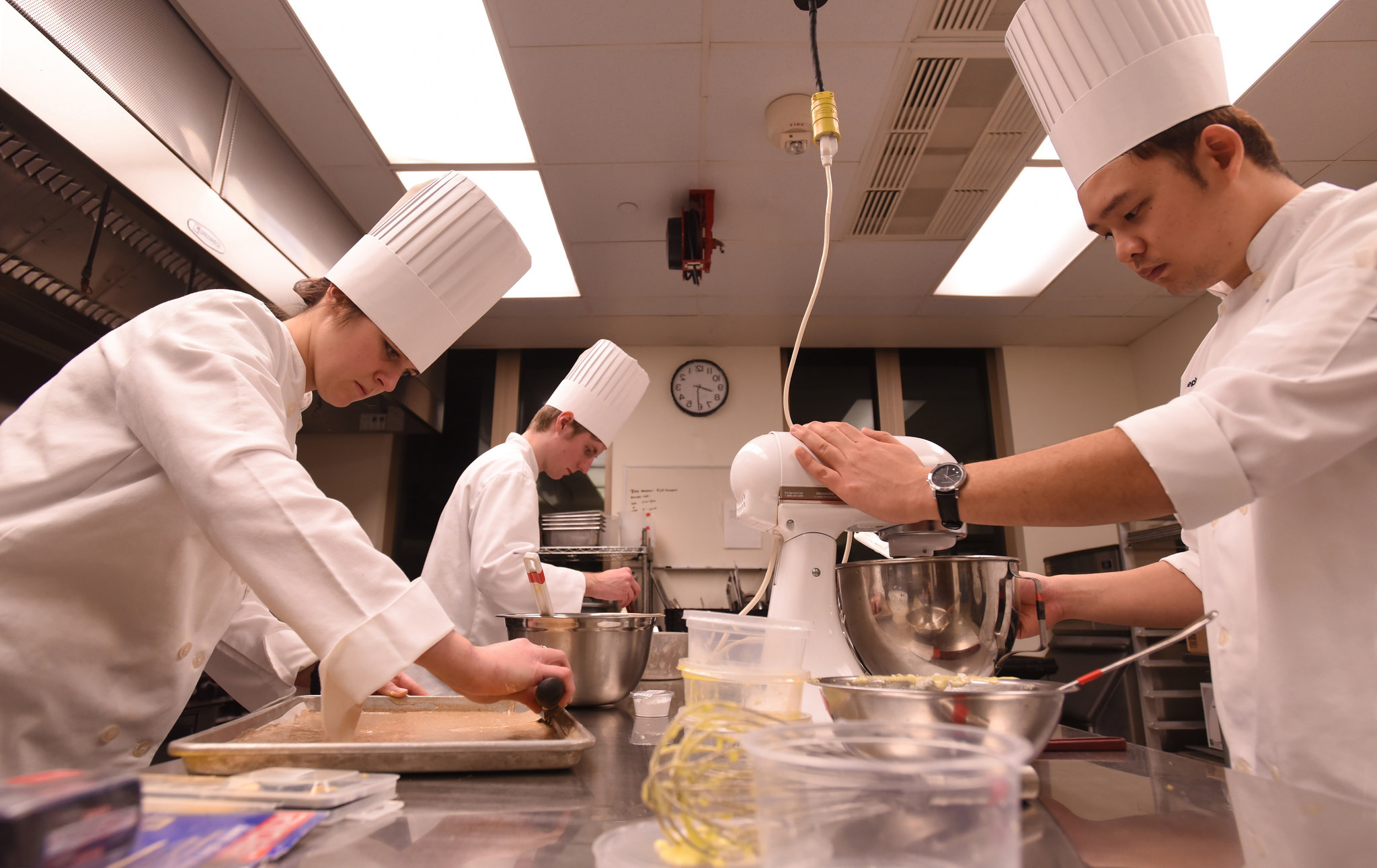
March 14, 2017
By Emily Lapinski
For the first time in its short history, Dominican’s culinology program is fielding a team for the Research Chef Association’s Student Culinology Competition, which is being held in Puerto Rico this year. On Thursday, March 16, they will be nose-to-the grindstone concocting their brazo Gitano pastry for a panel of judges.
Dylan Donovan, Morganne Schmidt and Joseph Oh have been preparing for this competition for more than six months, coming into the kitchen lab in Parmer on Saturday mornings from 7 a.m. to noon and Wednesday evenings from 6 to 10 p.m.—and they’re not even getting college credit for the experience.
Culinology, a trademarked program of the Research Chef Association, is the marriage of food science and culinary arts. Dominican’s program, launched in 2004, is one of only 15 RCA accredited programs in the country and the only program in the Midwest.
Each of the students came to Dominican with some experience in cooking, although Schmidt is the only one who didn’t attend culinary school. She is double majoring in chemistry and food applications and said that she especially enjoys the science as the root of cooking.
“I’m really interested in the science of food and knowing the processes of cooking—and answering questions like ‘why does my soufflé keep falling’,” Schmidt said. “This competition is giving me the hands-on experience that both Joseph and Dylan had before coming to Dominican.”
Donovan claims that he has wanted to be a chef since he was four, cooking eggs on the weekends with his dad. He grew up helping out his family’s catering business in Detroit. After getting his associate degree in culinary arts, he served an internship at America’s Test Kitchen in Boston and has worked in several food-related businesses.
Oh was born in South Korea and moved to the U.S. with his family when he was 10. As is the case with so many immigrant families, his parents worked long hours so he taught himself to cook. After graduating from Kendall College’s culinary school, he worked in restaurants in the Trump and Peninsula hotels.
The team’s brazo Gitano incorporates traditional Puerto Rican influences, one of the requirements of the competition. The team spent weeks visiting Puerto Rican groceries and bakeries in Chicago to determine exactly what they wanted to submit for the competition. Their dessert is a spiced sponge cake rolled with guava paste and coquito cream cheese. Each slice is drizzled with passion fruit gel and topped with fried plantain chips and coconut meringue and served with a poached guava half filled with coconut ice cream.
“We tweaked the ingredients about 20 times to create the best product, balancing the sugar and spices and favors to make sure they worked together,” Oh said.
In addition to developing a gold plate dessert—one that can be served in an elegant restaurant–the students were required to create a commercial version that can be frozen and sold in retail stores, to be microwaved by consumers and served warm. Creating a viable commercialized version required studying the manufacturing process and finding vendors for ingredients that could be substituted for the real thing. The students also worked with a packaging engineer to create the packaging for their commercialized version.
In order to prepare, students have done many dry runs of the competition, taping off counter space to make sure they are working in an area exactly the same size as the one they will have in Puerto Rico, working with the same utensils that they will use during the competition, and timing themselves repeatedly. All of the pots and pans, scales, utensils, and parchment paper they will need during the competition have been shipped via Fed Ex to San Juan.
During the competition, the students will have 15 minutes to get all of their equipment ready, 75 minutes to prepare their product and a 15-minute window to present their dessert to judges. In addition to the quality of their product, they will be judged on their cooking technique, cleanliness and sanitation, amount of waste, organization, teamwork and timeliness.
“Our team, Team Criollo, is learning to appreciate each other’s unique skills and to accept constructive criticism,” Caren Messina-Hirsch, lecturer in the nutrition sciences and the team’s coach said. “They have spent over 100 hours—while working part-time and going to school full-time. In the process, they have had fun working together and teasing each other. This is a unique student experience with many memories that will bond the team for life.”
There will be a live stream during the team’s portion of the competition from 10 to 11:45 a.m. in Parmer 108. Everyone is invited to come and cheer on our fellow students. You can also watch the competition on your own at: https://vimeo.com/204254382
lapiemil@my.dom.edu
